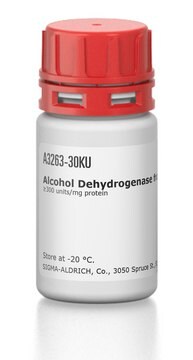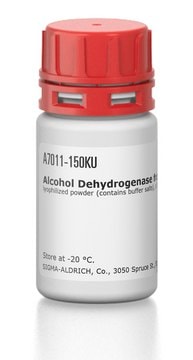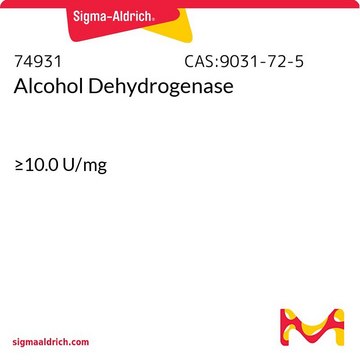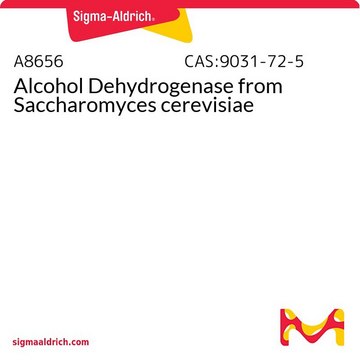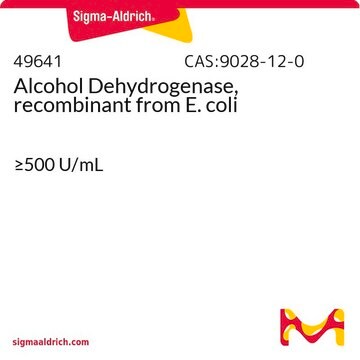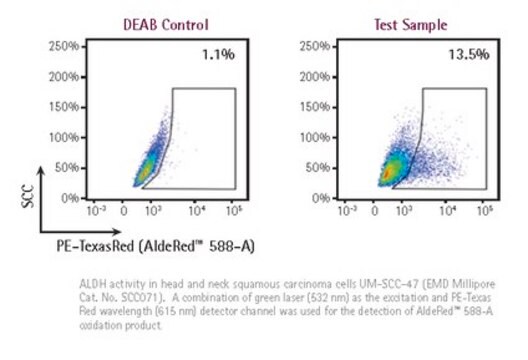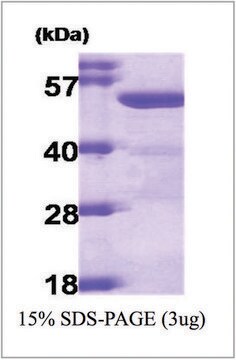추천 제품
사용
sufficient for 100 colorimetric tests
검출 방법
colorimetric
관련 질환(들)
gastrointestinal diseases
저장 온도
−20°C
유전자 정보
human ... ADH1A(124) , ADH1B(125) , ADH1C(126) , ADH4(127) , ADH5(128) , ADH6(130) , ADH7(131)
mouse ... ADH1C(11522) , ADH4(26876) , ADH5(11532) , ADH6A(69117) , ADH7(11529)
rat ... ADH1C(24172) , ADH4(29646) , ADH5(100145871) , ADH6(310903) , ADH6A(295498) , ADH7(171178)
일반 설명
The new Alcohol Dehydrogenase (ADH) Assay Kit, MAK498, is now available! Alcohol dehydrogenases (ADH) are a family of enzymes that catalyzes the conversion of alcohols to aldehydes, with the concomitant reduction of NAD+ to NADH. In humans, there are nine isozymes of ADH, with the majority of ADH activity occurring in the liver. ADH family members are the primary enzymes involved in alcohol detoxification. Genetic variations in ADH enzymes result in differences in ADH activity and tolerances for alcohol, and may regulate susceptibility to alcoholism.
애플리케이션
Alcohol Dehydrogenase Activity Assay Kit has been used to determine the activity of alcohol dehydrogenase.
적합성
Suitable for the detection of alcohol dehydrogenase in a variety of samples including tissue, cells and serum.
원리
The Alcohol Dehydrogenase Activity Assay kit provides a simple and direct procedure for measuring ADH activity in a variety of samples. ADH activity is determined using ethanol as the substrate in an enzyme reaction, which results in a colorimetric (450 nm) product proportional to the enzymatic activity present. One unit of ADH is the amount of enzyme that will generate 1.0 μmole of NADH per minute at pH 8.0 at 37 °C.
신호어
Danger
유해 및 위험 성명서
Hazard Classifications
Aquatic Chronic 3 - Eye Irrit. 2 - Flam. Liq. 2
Storage Class Code
3 - Flammable liquids
Flash Point (°F)
53.6 °F - closed cup
Flash Point (°C)
12.0 °C - closed cup
시험 성적서(COA)
제품의 로트/배치 번호를 입력하여 시험 성적서(COA)을 검색하십시오. 로트 및 배치 번호는 제품 라벨에 있는 ‘로트’ 또는 ‘배치’라는 용어 뒤에서 찾을 수 있습니다.
이미 열람한 고객
Kobi Simpson-Lavy et al.
Scientific reports, 9(1), 6491-6491 (2019-04-26)
Cells adapt their gene expression and their metabolism in response to a changing environment. Glucose represses expression of genes involved in the catabolism of other carbon sources in a process known as (carbon) catabolite repression. However, the relationships between "poor"
Rachel E N Reyes et al.
Brain research, 1747, 147067-147067 (2020-08-23)
Research focusing on the gut-brain axis is growing, but the interplay of ethanol (alcohol molecule), the gut microbiome, the brain and behavior is poorly understood. In the current study, we remodeled the gut microbiota by providing adult male C57BL/6J mice
Alcohol increases liver progenitor populations and induces disease phenotypes in human IPSC-derived mature stage hepatic cells
Tian L, et al.
International Journal of Biological Sciences, 12(9), 1052-1052 (2016)
Christopher M Ranger et al.
Proceedings of the National Academy of Sciences of the United States of America, 115(17), 4447-4452 (2018-04-11)
Animal-microbe mutualisms are typically maintained by vertical symbiont transmission or partner choice. A third mechanism, screening of high-quality symbionts, has been predicted in theory, but empirical examples are rare. Here we demonstrate that ambrosia beetles rely on ethanol within host
Sang-Hyuk Hong et al.
Phytotherapy research : PTR, 31(5), 783-791 (2017-03-17)
Although Pinus koraiensis leaf (PKL) was reported for its anti-diabetes, anti-obesity and anticancer effects as a folk remedy, the inhibitory effect of PKL on alcoholic fatty liver has never been elucidated yet. This study investigated the molecular mechanisms of PKL
자사의 과학자팀은 생명 과학, 재료 과학, 화학 합성, 크로마토그래피, 분석 및 기타 많은 영역을 포함한 모든 과학 분야에 경험이 있습니다..
고객지원팀으로 연락바랍니다.
